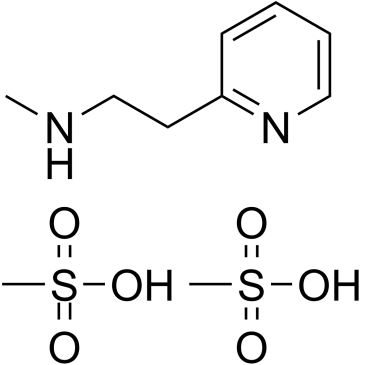Betahistine mesylate |
| Catalog No.GC60641 |
Le mésylate de bétahistine est un agoniste des récepteurs H1 de l'histamine actif par voie orale et un antagoniste des récepteurs H3.
Products are for research use only. Not for human use. We do not sell to patients.

Cas No.: 54856-23-4
Sample solution is provided at 25 µL, 10mM.
Betahistine mesylate is an orally active histamine H1 receptor agonist and a H3 receptor antagonist[1]. Betahistine mesylate is used for the study of rheumatoid arthritis (RA)[3].
Betahistine mesylate (0-10 μM) inhibits [125I]iodoproxyfan binding to membranes of CHO (rH3(445)R) and CHO (hH3(445)R) cells with IC50 values of 1.9 μM and 3.3 μM, respectively. Lead to Ki values of 1.4 μM and 2.5 μM, respectively[2].Betahistine mesylate (0-10 μM) has a regulating function on cAMP formation in CHO (rH3(445)R), CHO (rH3(413)R), and CHO (hH3(445)R) cells. At low concentrations, Betahistine mesylate behaves an apparent inverse agonist, and progressively enhances cAMP formation with EC50 values of 0.1 nM, 0.05 nM and 0.3 nM, respectively. In contrast, at concentrations higher than 10 nM, Betahistine mesylate inhibits cAMP formation with an EC50 value of 0.1 μM in CHO (rH3(445)R) and full agonist activity[2].
Betahistine mesylate (intraperitoneal or oral administration; 0.1-30 mg/kg; single dose) with acute administration has increased tele-methylhistamine (t-MeHA) levels with an ED50 of 0.4 mg/kg, indicating the inverse agonism. Besides, after acute oral administration, it increases t-MeHA levels with an ED50 of 2 mg/kg in male Swissmice[2].Betahistine mesylate (oral adminstration; 1 and 5 mg/kg; daily for 3 weeks) attenuates the severity of arthritis and reduces the levels of pro-inflammatory cytokines in the paw tissues of CIA mice[3]. Animal Model: Collagen-induced arthritis (CIA) DBA/1 male mouse model[3]
[1]. Poyurovsky M, et al. The effect of Betahistine mesylate, a histamine H1 receptor agonist/H3 antagonist, on olanzapine-induced weight gain in first-episode schizophrenia patients. Int Clin Psychopharmacol. 2005 Mar;20(2):101-3. [2]. Gbahou F, et al. Effects of Betahistine mesylate at histamine H3 receptors: mixed inverse agonism/agonism in vitro and partial inverse agonism in vivo.J Pharmacol Exp Ther. 2010 Sep 1;334(3):945-54. [3]. Tang KT, et al. Betahistine mesylate attenuates murine collagen-induced arthritis by suppressing both inflammatory and Th17 cell responses.Int Immunopharmacol. 2016 Oct;39:236-245
Average Rating: 5 (Based on Reviews and 34 reference(s) in Google Scholar.)
GLPBIO products are for RESEARCH USE ONLY. Please make sure your review or question is research based.
Required fields are marked with *




















